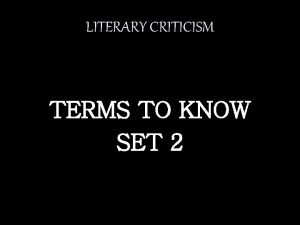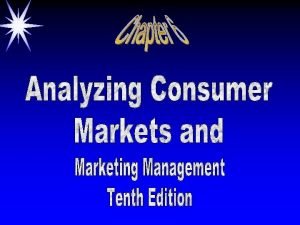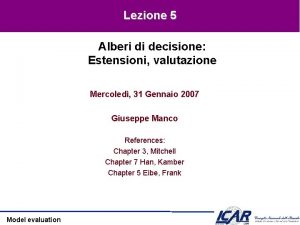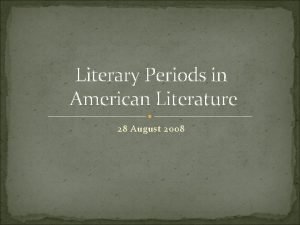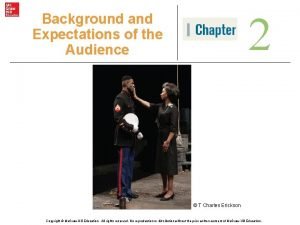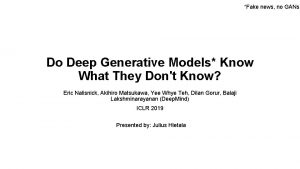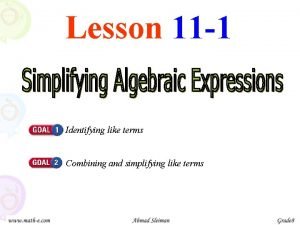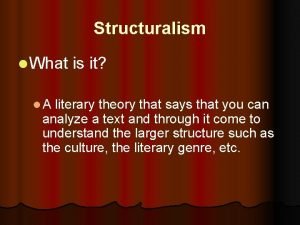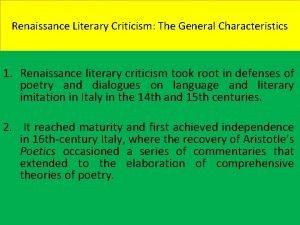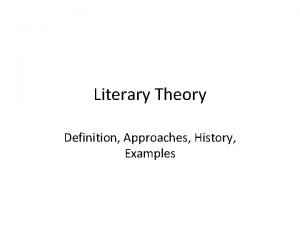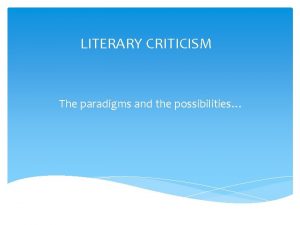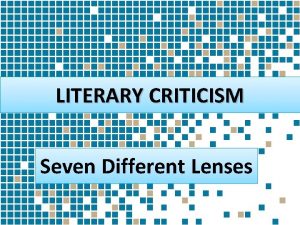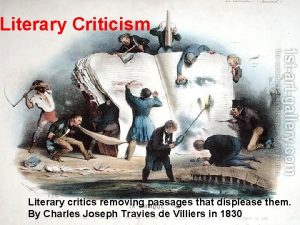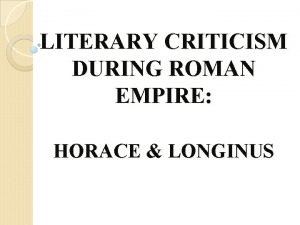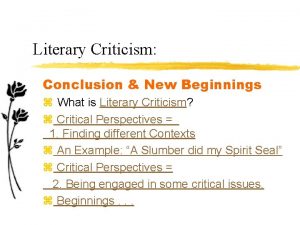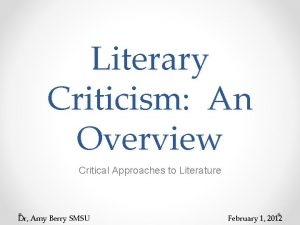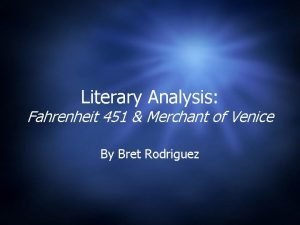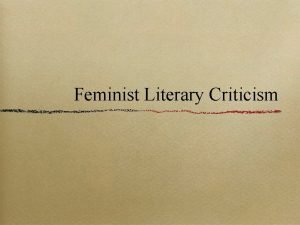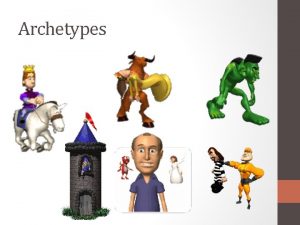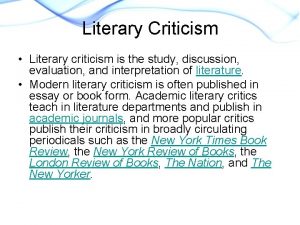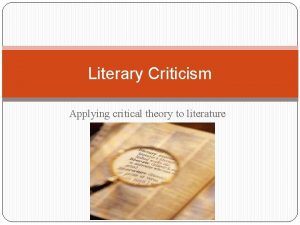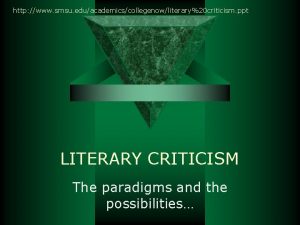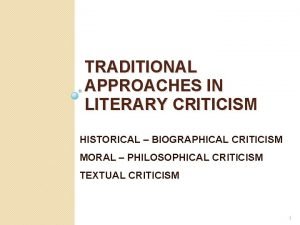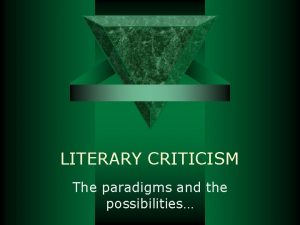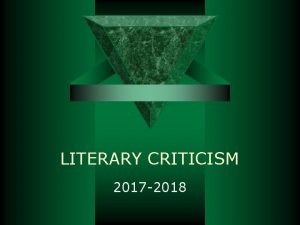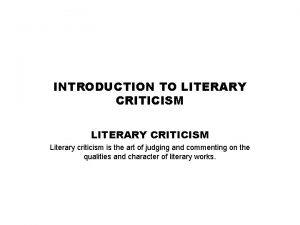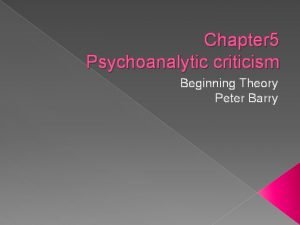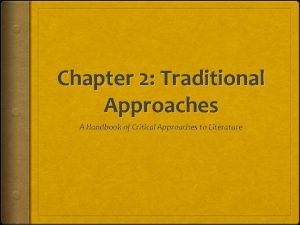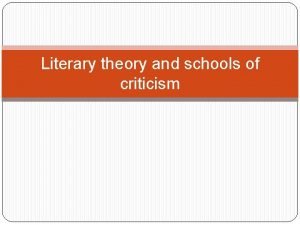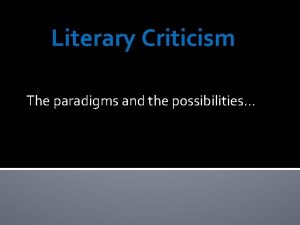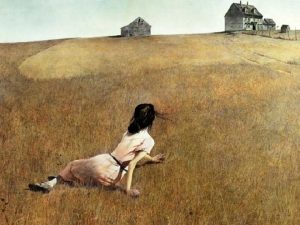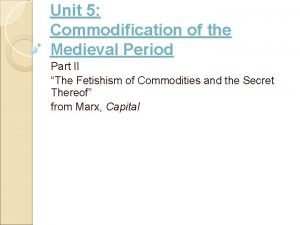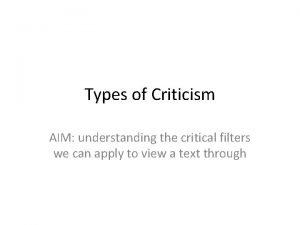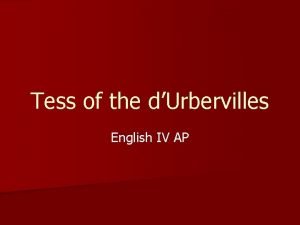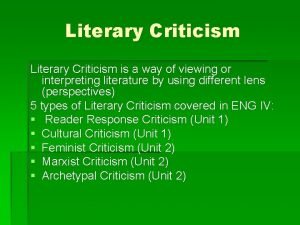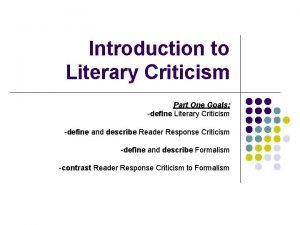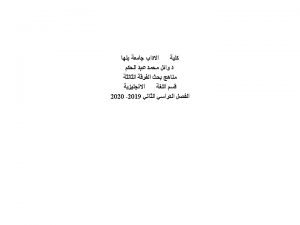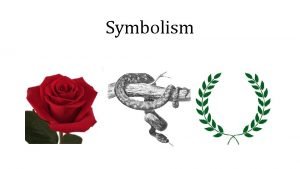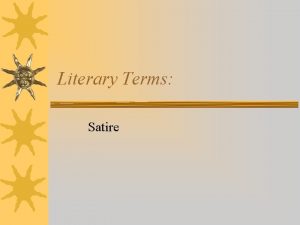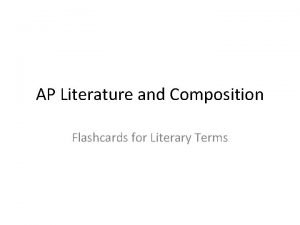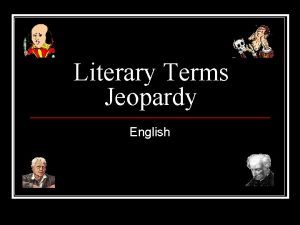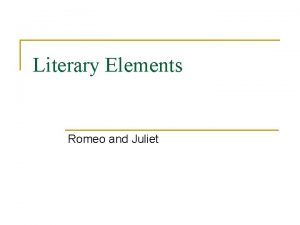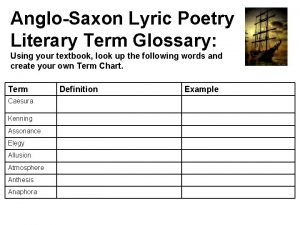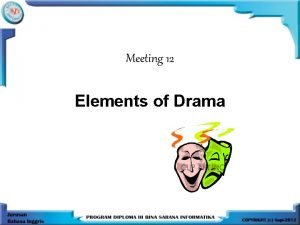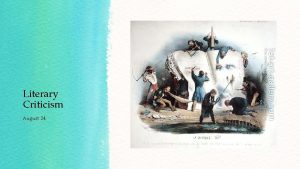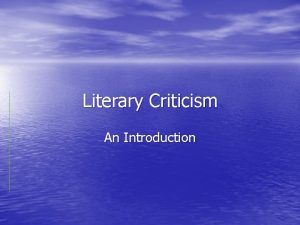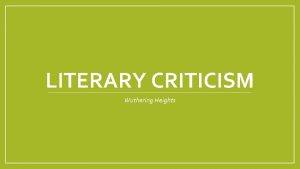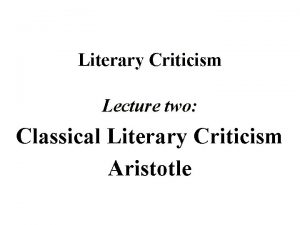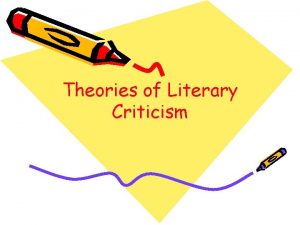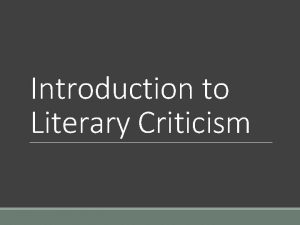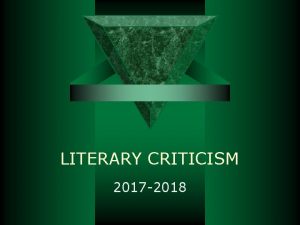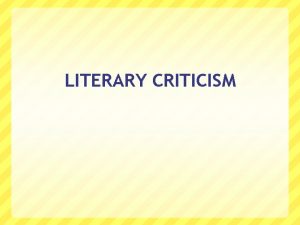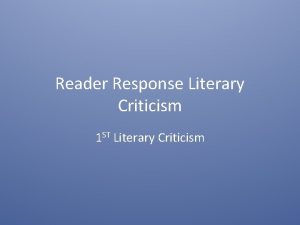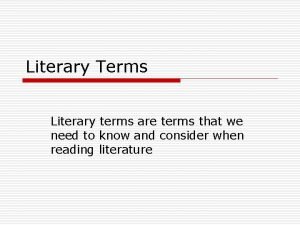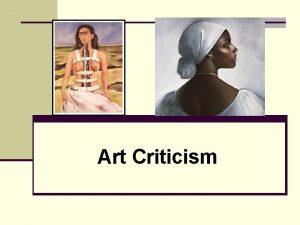LITERARY CRITICISM TERMS TO KNOW SET 2 PERIODS








































































































- Slides: 104

LITERARY CRITICISM TERMS TO KNOW SET 2

PERIODS OF AMERICAN LITERATURE Colonial Period: 1607 -1765 Revolutionary & Early National Period: 1765 -1830 Romantic Period: 1830 -1865 Realistic Period: 1865 -1900 Naturalistic & Symbolistic Period: 1900 -1930 Period of Conformity & Criticism: 1930 -1960 Period of the Confessional Self: 1960 - _____

HARLEM RENAISSANCE African American authors who produced works equal to whites during the 1920 s. Members: Gwendolyn Brooks, Zora Neale Hurston, Claude Mc. Kay, Dubose Heyward, Langston Hughes, Julia Peterkin, Jean Toomer, Arna Botemps

POTBOILER Something written solely for money. It is writing that will “keep the pot boiling. ”

RATIOCINATION The process of reasoning from data to conclusions. The terms was given literary significance by Poe, who wrote several of these type tales, among them “The Murders in the Rue Morgue, ” “The gold Bug, ” “The Purloined Letter, ” and “The Mystery of Marie Roget. ” As a literary term, it signifies a type of writing that solves, through logical processes, some sort of enigma.

SOLECISM A violation of prescriptive grammatical rules, like “he don’t” and “between you and I. ” This term is loosely any error in diction, grammar, or propriety. Some, however, reserve this term for errors in grammar and idiom alone, distinguished from catachresis.

TRIBE OF BEN SONS OF BEN They acknowledged Ben Jonson as their leader; this group included poets and Puritans. Members: Robert Herrick, Richard ovelace, Thomas Carew, John Suckling

SPOONERISM An accidental interchange of sounds, usually the initial consonants, in two or more words, such as “blushing crow” for “crushing blow” or “wellboiled icicle” for “well-oiled bicycle. ” The term owes its name to Dr. W. A. Spooner, of New College, Oxford, who was supposedly prone to such transpositions.

SYNECDOCHE A trope in which a part signifies the whole or the whole signifies the part. To be clear, it ought ot be based on an important part of the whole and, usually, the part standing for the whole ought to be directly associated with the subject under discussion. Thus, under the first restriction, we say “threads” for “clothes” or “wheels” for “car, ” and under the second restriction we speak of infantry on the march as “foot” rather than as “hands”…just as we use “hands” (rather than “foot”) for people who work in manual labor.

TAUTOLOGY The use of repetitious words. This term repeats an idea without adding force or clarity. For example, since “devoid” means “completely empty, ” the use of “wholly devoid” would be ______.

JEU D’ESPRIT A witty playing with words, a clever sally. Much of Tomas Hood’s verse, for example, may be said to be marked by a happy ______. The term is also applied to brief, clever pieces of writing, such as Benjamin Franklin’s “bagatelles. ”

JEREMIAD A prophesy. A work that foretells destruction because of the evil of a group.

IMPRECATION A curse: a malediction

CHANSON de JESTE A “song of great deeds. ” The earliest and best example is the Chanson de Roland, c. 1100.

ACATALECTIC Metrically complete; applied to lines that carry out the basic metrical and rhythmic pattern of a poem.

ACCISMUS A form of irony, a pretended refusal that is insincere or hypocritical. Ex: Caesar’s refusal of the crown as reported by Casca in Shakespeare’s Julius Caesar.

ACROSTIC A composition, usually verse, arranged in such a way that it spells words, phrases, or sentences when certain letters are selected according to an orderly sequence. Ex. From the poem at the end of Lewis Carroll’s Through the Looking Glass A boat, beneath the sunny sky, Lingering onward dreamily In an evening of July – Children three that nestle near, Eager eye and willign ear…

ANALEPTIC An aspect from the past of the unconscious mind is restored to vivid life in the present or conscious mind. A recovery to restoration.

ANAPHORA (also called Epanaphora) One of the devices of repetition, in which the same expression (word or words) is repeated at the beginning of two or more lines, clauses, or sentences. As I ebb’d with the ocean life, As I wended the shores I know, As I walk’d where the ripples continually wash you Paumanok.

ANASTROPHE Inversion of the usual, normal, or logical order of the parts of a sentence.

ANGRY YOUNG MEN They demonstrated bitterness in their attacks on the outmoded, bourgeoisie values of Britain; the name came from the title of Leslie Paul’s autobiography. Members: Leslie Paul, John Osborne, Kingsley Amis, John Braine, Leigh Hunt

DRAMATIC PERSONAE The characters in a drama, a novel, or a poem. The term is also applied to a listing of the characters in the program of a play, at the beginning of the printed version of a play, or sometimes at the beginning of a novel. Such a list often contains brief characterizations of the persons of the work and notations about their relationships.

BIBLE TRANSLATIONS Caedmonian – 7 th century poetic paraphrases Bede – 7 th century prose translation of Gospel of St. John King Alfred – 9 th century glosses of Psalms and prose translations West Saxon – Gospels and Lindisfarne Gospels; 10 th century Richard Rolle – 14 th century English versions and commentaries

BILDUNGSROMAN A novel that deals with the development of a young person, usually from adolescence to maturity; it is frequently autobiographical. Ex: Dickens’s Great Expectations

BILLINGSGATE Course, foul, vulgar, violent, abusive language. The term is derived from the fact that the fishmongers in this particular fish market in London achieved distinction for the scurrility of their language.

BLUESTOCKINGS Women of pronounced intellectual interest in London who worked to promote interest in literature. Only one male member – Horace Walpole. Members: Elizabeth Montague, Hannah More, Fanny Burney, Hester Chapone

BON MOT A witty repartee or statement. A clever saying.

BRAGGADOCIO A noisy braggart who is actually a coward. Although the name comes from a character in Spenser’s Faerie Queene, the ______ is really a stock character with a long history stretching back to Greek and Roman comedy.

BREAD & CHEESE GROUP Social club not restricted to literary activities. Members: James F. Cooper, Samuel B. Morse, William Dunlap

BRITISH LITERATURE: 428 - 1500 Old English: 428 – 1100 Anglo-Norman: 1100 -1350 Middle English: 1350 -1500

BRITISH LITERATURE: PERIODS OF THE ENGLISH RENAISSANCE 1500 -1660 Early Tudor: 1500 -1557 Elizabethan: 1558 -1603 Jacobean: 1609 -1625 Caroline: 1625 -1649 Commonwealth Interregnum: 1649 -1660

BRITISH LITERATURE: PERIODS OF THE NEOCLASSIC AGE 1660 -1798 Restoration: 1660 -1770 Augustan Age: 1770 -1750 Age of Johnson: 1750 -1798

BRITISH LITERATURE: PERIODS OF THE ROMANTIC & REALISTIC AGE 1798 -1914 Romantic: 1798 -1870 Age of the Romantic Movement: 17981832 Early Victorian: 1832 -1870 Realistic: 1870 -1914 Late Victorian: 1870 -1901 Edwardian: 1901 -1914

BRITISH LITERATURE: Periods of the Modernist & Post Modern/Contemporary 1914 -present Georgian: 1914 -1940 Diminishing Age: 1940 -1965 Post Modern/Contemporary: 1965 present

CAVALIER LYRICISTS They supported Charles I and wrote light-hearted poetry. Their motto was Carpe Diem. Members: Robert Herrick, Richard Lovelace, Thomas Carew, John Suckling

CHIASMUS A pattern in which the second part is balanced against the first, but with the parts reversed, as in Coleridge’s line, “flowers are lovely, but love is flowerlike. ”

CONFESSIONAL POETRY Works of contemporary poets whose poetry features a public and sometimes painful display of private and personal matters. Members: Theodore Roethke, Anne Sexton, Allen Ginsberg, Robert Lowell, Sylvia Plath, John Berryman

DADAISM A movement in Europe during and just after the First World War, which ignored logical relationship between idea and statement, argued for absolute freedom, and delivered itself of numerous provocative manifestos.

DIRGE A wailing song sung at a funeral or in commemoration of death. A short lyric of lamentation.

DITTY A song, a refrain. The term is used for any short, simple, popular melody.

DOGGEREL Rude Verse. Any poorly executed attempt at poetry. Characteristics of this are monotony of rhythm and rhyme, cheap, sentiment and trivial, trite subject matter.

DRAWING ROOM COMEDY A form of the COMEDY OF MANNERS that deals with high society. It is called this because it is usually a WELL-MADE-PLAY with its actions centered indoors, often literally in a drawing room.

DUALISM A doctrine (as opposed to monism) that recognizes the possibility of the coexistence of antithetical or complementary principles. In monistic schemes, mind is reducible to matter (as in behaviorism), or matter is reducible to mind (as in mysticism); in _______, mind and matter both exist.

ECPHONEMA, ECHONESIS An outcry or exclamation, sometimes indicated by “oh” or “ah, ” along with an exclamation point.

EISTEDDFOD A Welsh festival of poetry and song, dating back many centuries. Now annual and more or less official, the _______ has been important in maintaining communication among writers.

ENCOMIUM In Greek literature a composition in praise of a living person, object, or event, but not a god, delivered before a special audience.

FILIDH (pl. FILI) Early Irish professional poets.

FU A technical term used in the Briggsian school of alfresco film criticism; appropriated from the Chinese “kung fu, ” the Briggsian application of ____ means mindless violence.

GASCONADE Because Gascons were considered inveterate boasters, this term came to mean bravado or boastful talk.

GEST An old word occasionally found in English, especially in literary titles from the medieval period meaning a tale of war or adventure, as the Gest Historiale of the Deconstruction of Troy (14 th century).

HAGIOGRAPHY Writing about the saints.

HELLENISM The Greek spirit, which manifests itself in the celebration of the intellect and of beauty.

OEDIPUS COMPLEX In psychoanalysis a libidinal feeling that develops in a child, especially a male child, between the ages of three and six, for the parent of the opposite sex. This attachment is generally accompanied by hostility to the parent of the child’s own sex. It is named for the ancient Theban hero who unwittingly slew his father and married his mother.

MUCKRAKERS 1902 -1911. They worked to expose the dishonest methods unscrupulous motives in big business and in national governments. They also published magazines: The Arena, Everybody’s Mc. Clure’s, The Independent, Collier’s, and Cosmo. Members: Ida Tarbell, Mark Sullivan, Lincoln Steffens, Samuel H. Adams, T. W. Lawson, Upton Sinclair

METATHESIS The interchange of position between sounds in a word. An example is when one hears “pretty” pronounced as “perty. ” When ______ occurs between words, the result is a spoonerism, whereby “loving shepherd” is mistakenly said as “shoving leopard. ”

MASCULINE RHYME Rhyme that falls on the stressed, concluding syllables of the rhyme words. This term account for a majority of rhymes in English. “Mount” and “fount” are an example of this.

MACABRE Originally in danse macabre or Dance of Death, the obscure word relates to both subject and style, a gruesome combination of farce and tragedy.

LOST GENERATION Writers who served in World War I and reacted against older writers of the times. They blamed the loss of traditional values on war & other social evils. They got their name from Gertrude Stein who had a house in Paris where most of them lived at one point. Members: Ernest Hemingway, Louis Bromfield, F. Scott Fitzgerald, Malcolm Cowley, Harte Crane

LITOTES A form of understatement in which a thing is affirmed by stating the negative of its opposite. To say, “She was not unmindful” when one means that “She gave careful attention, ” is an example.

KILL FEE Money paid to an author in compensation for material that has been requested or commissioned, but not used (that is, the material that has been “killed”).

KITSCH From the German term for “gaudy trash”; shallow, flashy art designed to have popular appeal and commercial success.

KENNING A figurative phrase used in Old Germanic languages as a synonym for a simple noun. These are often picturesque metaphorical compounds. Specimen kennings from Beowulf are “the bent-necked wood, ” “the ringed prow, ” “the foamy-necked, ” “the sea -wood, ” and the “sea-farer, ” for ship.

MORPHOLOGY A word coined by Goethe for the study of forms at any level.

MIMESIS The Greek for imitation, often used specifically to indicate Aristotle’s theory of imitation. ______ in a narrower sense has been used by Northrop Frye to designate works that imitate characters on a human level (as distinct from the superhuman levels fo myth and romance as well as the subhuman level of irony).

JUVENALIAN SATIRE Formal satire in which the speaker attacks vice and error with contempt and indignation. It is so called because it is like the dignified satires of Juvenal. Samuel Johnson’s “The Vanity of Human Wishes” is a wellknown example. _______ in its realism and its harshness is in strong contrast to Horation Satire.

HORATION SATIRE In general, a gentler, more good humoured and sympathetic kind of satire, somewhat tolerant of human folly even while laughing at it. Named after the poet Horace, whose satire epitomized it. ______ tends to ridicule human folly in general or by type rather than attack specific persons.

LEITMOTIF In art, a recurrent repetition of some word, phrase, situation, or idea, such as tends to unify a work through its power to recall earlier occurrences.

LEVEL A metaphor that relates to our sense of the relative dignity, complexity, and rarity of something. We speak of the ____ of one’s vocabulary as high, plain, or low; we also speak of ______ of meaning – surface or deep.

VERFREMDUNGSEFFEKT German for alienation effect. Of particular importance in the drama, this term was advocated by Bertolt Brecht as a means by which performers and audiences alike could avoid undue emotional identification with a work – an identification that needs to be neutralized and controlled I the work is to have its intended intellectual and political influence.

VERSIMILITUDE The semblance of truth. The term indicates the degree to which a work creates the appearance of the truth. The word was a favorite with Poe, who used it in the sense of presenting details, however farfetched, in such a way as to give them the impression of the truth. An example is Daniel Defoe’s “True Relation of the Apparition of One Mrs. Veal. ”

THE BEAT GENERATION (conformity & criticism) Poets and novelists in the 150 s and 1960 s. It was a romantic rebellion against what they conceived as American culture – expressed revolt through works of loose structure and slang. Members: Allen Ginsberg, William Burroughs, Lawrence Ferlinghetti, Jack Kerouac

THE GREEK MUSES All the daughters of Zeus and Mnemosyne (Memory) • Calliope – Epic poetry • Melpomene – Tragedy • Erato – Lyrics & love poetry • Euterpe – Music • Polyhymnia – Sacred choric poetry • Thalia – Comedy • Urania – Astronomy • Terpischore – Choral dance & song • Clio - History

PARAGRAM Generally, a word that resembles another and is used in its place for the sake of euphemism, apotropaic deformation, insult, avoidance of libel, or some other purpsoe. Example: using “gad, ” “gosh, ” and/or “golly, ” rather than “God. ”

OLLAVE Among the early Irish, a person of wisdom and learning; a poet sometimes ranking below a Druid, but above a Bard.

OBLIQUE RHYME Approximate but not true rhyme; ______ is another term for near rhyme, half rhyme, and slant rhyme.

NIHIL OBSTAT Lating for “nothing obstructs, ” used in the Roman Catholic church to grant permission to publish a book.

NEW YORK SCHOOL A group of American poets who flourished between 1950 and 1970, distinguished by urbanity, with, learning, spontaneity, and exuberance. Led by Frank O’Hara (19261966), these poets exploited certain interests and sympathies; the culture of France, modern painting (surrealism and abstract expressionism in particular), jazz, Hollywood movies and city life.

NEW HUMANISM An American critical school in the first third of the twentieth century that emphasized the moral qualities of literature.

MAGNUM OPUS A great work, a masterpiece. Formerly the term was used in all seriousness, but nowadays it often connotes irony or sarcasm.

LOCALE The physical setting of some action. It denotes geographical setting and scenic qualities rather than the less tangible aspects of setting.

TYPES OF CHARACTERS • Round – can surprise reader without losing credibility • Dynamic – character who develops and changes as a result of plt actions • Static – conventional character types • Flat – single sentence recognition • Stock – static characters (i. e. scheming murder villain, ghosts of murdered relatives, vengeance seeking hero, romantic heroine).

TROUBADOUR A name given to the lyric poets and composers of Provence (southern France) in the 12 th and 13 th centuries. The name comes from a word meaning “to find, ” suggesting the ______ was regarded as an inventor and experimenter. They were essentially lyric poets, occupied with love and chivalry. Its poetry figured into the developmetn of corutly love and influenced the troiuveres of northiern France. The earliest ______ of record is William IX of Aquitaine (1071 -11 -27); other famous ______ are Bernard de Ventadour, Bertran de Born, and Artnaut Daniel. Some modern ______ include Ezra Pound, T. S. Eliot, and Paul Blackburn.

THE PRINTING PRESSES • Gutenburg (1456) Germany • Caxton (1476) England – learned from Gutenburg • Oxford (1478) England – learned from Caxton • St. Albans (1479) England – also learned from Caxton

THE NEW JOURNALISM A species of writing that owes something to the example of H. L. Menken, John Dos Passos, and Ernest Hemingway; and even reaches back as far as Daniel Defoe for precursors. As it emerged after the second World War, the ______ was founded on conventional journalistic or historical coverage of events, but gave up traditional impersonality and invisibility of the journalist as such and offered instead a subjective style and voice that openly admit the personal presence and involvement of a Tom Wolfe, Norman Mailer, Hunter S. Thompson, Joan Didion, Mark Harris, John Mc. Phee, and Truman Capote.

INCUNABULUM A term applied to any book printed in the last part of the 15 th century (before 1501). Since the first printed books resembled in size, form and appearance the medieval manuscript, which had been developed to a high degree of artistic perfection, these are commonly large and ornate. They are prized by modern collectors.

UNIVERSITY WITS A name used for certain young university people who came to London in the late 1580 s and undertook careers as professional writers. They played an important part in the development of the great literature, especially the drama, that characterized the latter part of Elizabeth’s reign. The most important was Christopher Marlowe. Others were Robert Green, George Peele, Thomas Lodge, Thomas Nash, and Thomas Kyd. Some authorities include John Lyly, though he was older and perhaps not personally associated with the others. The lived irregular lives, Green and Marlowe being particularly known as Bohemians.

IMPORTANT AUTHORS

JANE AUSTEN Lived from 1775 -1817 • Persuasion • Northanger Abbey • Emma • Pride and Prejudice • Sense and Sensibility

WILLIAM WORDSWORTH Lived from 1770 -1850 • Descriptive Sketches • The Borderers • Prelude • Excursion • Lyrical Ballads (with Coleridge) • 2 nd Edition of Lyrical Ballads w/famous Preface (with Coleridge)

CHARLES DICKENS Lived from 1812 -1870 • Great Expectations • Bleak House • Hard Times • Pickwick Papers • Oliver Twist • American Notes • Cricket on the Hearth • David Copperfield • Little Dorrit • Tale of Two Cities • Our Mutual Friend • Old Curiosity Shop • Christmas Carol

JOHN DRYDEN Lived from 16311700 • Absalom and Achitophel • Mac. Flecknoe • The Indian Queen (a) (written with Howard) • The Hind & the Panther The Indian Emperor • Alexander’s Feast Essay on Dramatic Poesy • Stanzas on Death of Cromwell Conquest of Granada All for Love

GEORGE ELIOT Real name is Mary Ann Evans Lived from 1819 -1880 • Scenes of a Clerical Life • Adam Bede • Mill on the Floss • Silas Marner • Romola • Middle March • Daneil Deronda

T. S. ELIOT Lived from 1888 -1965 • Love Song of Alfred Prufrock • Poems 1920 • The Waste Land • Ash Wednesday • Murder in the Cathedral • Four Quartets • The Cocktail Party • A Confidential Clerk • The Elder Statesman

RALPH WALDO EMERSON Lived from 1803 -1882 • Nature • Essays: Second Series • Poems • Representative Man • English Traits • Conduct of Life

WILLIAM FAULKNER Lived from 18971962 • The Sound & the Fury • Sanctuary • Light in August • Absalom, Absalom! • The Hamlet • Go Down, Moses • Intruder in the Dust • Requiem for a Nun • A Fable • The Town • The Mansion • The Rivers

ERNEST HEMINGWAY Lived from 1899 -1961 • The Garden of Eden • In Our Time • The Sun Also Rises • A Farewell to Arms • The Fifth Column & the First 49 Stories • For Whom the Bell Tolls • Across the River and Into the Trees • The Old man and the Sea • A Moveable Feast • Islands in the Stream

HENRY JAMES Lived from 18431916 • Roderick Hudson • The American • Daisy Miller • The Portrait of a Lady • Washington Square • The Bostonians • Princess Casamassima • Partial Portraits • Aspern Papers • Tragic Muse • The Real Thing & Other Tales • The Wings of the Dove • The Ambassadors • The Golden Bowl • The Sacred Fountain

JOHN KEATS Lived from 1795 – 1821 • Poems • Lamia. . . and Other Poems • Endymion

J. D. SALINGER Lived from 1919 – • Catcher in the Rye • Franny and Zooey • Raise High the Roof Beam, Carpenters

EUGENE O’NEILL Lived from 18881953 • Marco Millions • Moon on the Caribees • Morning Becomes Electra • The Iceman Cometh • The Emperor Jones • A Long Day’s Journey • The Hairy Ape Into the Night • Beyond the Horizon • More Stately Mansions • Anna Christie • Desire Under the Elms • A Touch of the Poet • The Great God Brown

MARK TWAIN Lived from 1835 -1910 Real name was Samuel Clemens • “The Celebrated Jumping Frog of Calveras Cty” • The Innocent Abroad • Roughing It • Tom Sawyer • The Prince & the Pauper • Life on the Mississippi • A Connecticut Yankee in King Arthur’s Court • Pudd’nhead Wilson • Huckleberry Fin • The Mysterious Stranger

EUDORA WELTY Lived from 1909 – • • • A Curtain of Green Delta Wedding The Golden Apples The Optimist’s Daughter Losing Battles

GEOFFREY CHAUCER Lived from 1340 -1400 • Book of the Duchess • House of Fame • Troilus and Criseyde • Legend of a Good Woman • Canterbury Tales

THE END This concludes the second of two installments of “Terms to Know” for UIL Literary Criticism.
 Periods of literary criticism
Periods of literary criticism Total set awareness set consideration set
Total set awareness set consideration set Training set validation set test set
Training set validation set test set British literature periods
British literature periods American literary periods
American literary periods British literary periods timeline
British literary periods timeline Literary time periods
Literary time periods Literary periods timeline
Literary periods timeline Bible verses about constructive criticism
Bible verses about constructive criticism Constructive vs destructive criticism
Constructive vs destructive criticism Difference between russian formalism and new criticism
Difference between russian formalism and new criticism Descriptive criticism vs prescriptive criticism
Descriptive criticism vs prescriptive criticism Know history know self
Know history know self Normalizing flow
Normalizing flow I know who goes before me
I know who goes before me Whats your name bob
Whats your name bob Electrician terms to know
Electrician terms to know Polynomial classification
Polynomial classification Combine like terms
Combine like terms Do you know set
Do you know set Do you know set
Do you know set Post structuralism in literature
Post structuralism in literature Literary criticism in the renaissance
Literary criticism in the renaissance Psychological criticism literary theory
Psychological criticism literary theory Archetypal/mythological literary theory
Archetypal/mythological literary theory Theory definition
Theory definition Definition of psychoanalytic criticism
Definition of psychoanalytic criticism Lens in literature
Lens in literature Archetypal criticism questions
Archetypal criticism questions Longinus contribution literary criticism
Longinus contribution literary criticism Conclusion of literary criticism
Conclusion of literary criticism Approaches to literary criticism
Approaches to literary criticism Sociological criticism in literature
Sociological criticism in literature Literary analysis of fahrenheit 451
Literary analysis of fahrenheit 451 Structuralism literary criticism
Structuralism literary criticism What is post structuralism in literary criticism
What is post structuralism in literary criticism Poststructuralism and deconstruction
Poststructuralism and deconstruction Phallocentrism in literature
Phallocentrism in literature Feminist literary criticism
Feminist literary criticism What are two goals of feminist literary criticism
What are two goals of feminist literary criticism Critical lenses in english
Critical lenses in english Archetypes literary definition
Archetypes literary definition What is new criticism
What is new criticism Queer theory in literary criticism ppt
Queer theory in literary criticism ppt Ia richards principles of literary criticism
Ia richards principles of literary criticism Define literary criticism
Define literary criticism History of biographical criticism
History of biographical criticism Literary approaches
Literary approaches Owl purdue critical race theory
Owl purdue critical race theory Similarities of structuralism and formalism
Similarities of structuralism and formalism Advantages and disadvantages of literary criticism
Advantages and disadvantages of literary criticism Tenets of psychoanalytic theory in literature
Tenets of psychoanalytic theory in literature Traditional approach in literary criticism
Traditional approach in literary criticism Structuralism theory in literature
Structuralism theory in literature Literary criticism map
Literary criticism map Approach in literary criticism
Approach in literary criticism Marxist critical lens
Marxist critical lens Types of literary criticism
Types of literary criticism Tess of the d urbervilles literary criticism
Tess of the d urbervilles literary criticism Types of literary criticism
Types of literary criticism Types of literary criticism
Types of literary criticism Owl purdue subject verb agreement
Owl purdue subject verb agreement What is an axiomatic system in geometry
What is an axiomatic system in geometry Literary elements jeopardy
Literary elements jeopardy Literary device
Literary device Symbols in literature
Symbols in literature Poetry terms hyperbole
Poetry terms hyperbole Nonfiction literary terms
Nonfiction literary terms Literary terms epic
Literary terms epic Ap english literature terms
Ap english literature terms Simile music definition
Simile music definition Literary technique vs literary device
Literary technique vs literary device Alliteration poetic device
Alliteration poetic device Metaphor definition literature
Metaphor definition literature Repetition in poetry
Repetition in poetry Ode poetry definition
Ode poetry definition What is an elegy in literature
What is an elegy in literature Literary terms of drama
Literary terms of drama Literary techniques in to kill a mockingbird
Literary techniques in to kill a mockingbird Onomatopoeia in shrek
Onomatopoeia in shrek Alliteration examples in macbeth
Alliteration examples in macbeth Setting of lord of the flies
Setting of lord of the flies Literary terms satire
Literary terms satire Literary terms games
Literary terms games Mood words
Mood words The lottery exposition
The lottery exposition Extended metaphor in romeo and juliet
Extended metaphor in romeo and juliet Flashback literary devices
Flashback literary devices Denotation literature example
Denotation literature example Literary terms project
Literary terms project Literary term diction
Literary term diction Ap english literature and composition flashcards
Ap english literature and composition flashcards 75 literary terms elements and devices
75 literary terms elements and devices The most dangerous game literary terms
The most dangerous game literary terms Jeopardy literary terms
Jeopardy literary terms Literary terms jeopardy
Literary terms jeopardy Literary reference definition
Literary reference definition Indirect characterization examples in literature
Indirect characterization examples in literature Romeo and juliet alliteration
Romeo and juliet alliteration Rolling stone
Rolling stone A two word poetic renaming
A two word poetic renaming Anastrophe
Anastrophe Literary terms epic
Literary terms epic What is comedy in drama
What is comedy in drama Literary terms symbol
Literary terms symbol
